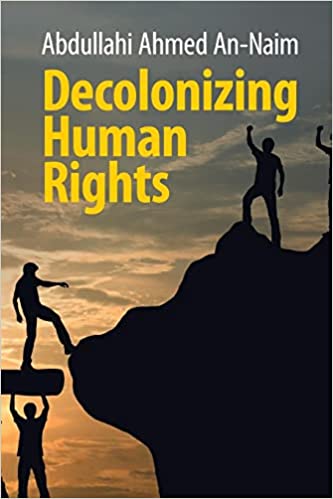
Decolonizing Human Rights
by Abdullahi Ahmed An-Na’im
Review by Firas Masri
President Joe Biden and members of his administration have constantly reiterated the position that “human rights will be the center of our foreign policy.” Despite this claim, the Biden administration has failed to hold violators of human rights accountable. The U.S. government continues to support the Saudi-led coalition’s war in Yemen and fund the Egyptian military, despite human rights violations committed by each of these US security partners.

According to An-Na’im’s latest book, the lack of human rights enforcement from the United States and other global powers exhibits an inherent flaw in the international human rights regime. The former colonial powers of Western Europe, Russia, and the United States—the Global North—have become the arbiters of the “human rights paradigm” and its enforcement on former colonized societies—the Global South—serves to “protect their strategic interests and enhance their geopolitical and economic hegemony (12).” An-Na’im argues that the current state-centric approach to human rights continues to demonstrate its inability to protect human rights in earnest. When the prospect of upholding human rights comes into conflict with the interests of the state, national interests take precedent. Therefore, An-Na’im proposes a new “people-centered” human rights model that requires the cultural transformation and political mobilization of communities.
An-Na’im offers a broad solution to supplant the state-driven model of the human rights paradigm, but he explains what a transition to this model might look like in extraordinary detail. Throughout his argument, An-Na’im gives a thoughtful description of the numerous problems that curtail the enforcement of human rights in the present system. The main problem with the human rights paradigm centers on the inherent inequality present in international relations. States from the Global North arbitrarily decide what aspects of international law they wish to uphold. An-Naim contends that the five permanent members (FPM) of the UN Security Council (UNSC) illustrate the most prominent example of this theory. When it comes to the case of upholding human rights in Syria, American, British, or French-sponsored resolutions often get vetoed by the Russian and Chinese bloc. In the Israeli-Palestinian conflict, US vetoes often derail resolutions that attempt to hold Israel responsible for alleged war crimes. The vetoes from the FPM in these two examples occur for a variety of reasons, but the main point here demonstrates how the vetoes cast in these examples stem from national interests—which An-Na’im clearly points out in the text.
The main problem with the human rights paradigm centers on the inherent inequality present in international relations.
At the center of An-Na’im’s book is the culmination of years of cross-cultural dialogue on human rights. His previous work calls for a reinterpretation of Sharia—Islamic law derived from the Qur’an and the traditions of Prophet Muhammad, known as Hadith—and it provides context for his discussion on the need to revise the definition of human rights law. Like Sharia, the Universal Declaration of Human Rights (UDHR)—first adopted by the United Nations in 1948—should continue to evolve to address issues that arise in contemporary society. Specific to the purposes of An-Na’im’s book, the UDHR has not evolved to support pluralistic societies, which has left the interpretation of human rights in the hands of the Global North.
In the first section, An-Na’im outlines the problems inherent in the current understanding of the UDHR. He foregrounds this discussion by highlighting the “disproportionate power and influence in international relations” exhibited by former colonial states (17). Furthermore, An-Na’im observes how the Global North acts as “gate-keepers of the so-called international community by controlling membership and operations and functioning of the UN (17).” These two principles remain central to the arguments that follow. As such, An-Naim asserts that the Global North has coerced the Global South into accepting the former’s interpretation of the “universality of human rights.”
The misinterpretation of the UDHR and the discourse concerning universal human rights norms exhibits a legal fallacy best explained through the concept of liberal relativism. An-Na’im emphasizes how the Global North utilizes liberal relativism that “pretends to be global universalism” to impose its conception of universal human rights on the rest of the world (15). Yet, An-Na’im’s primary objective is to “promote consensus and compliance with evolving human rights norms as identified by local communities and internalized through socialization processes” (14). He argues that societies must first recognize this fallacy before they can embark on the cultural transformation and political mobilization required to determine what human rights system can support the universal protection for individual communities. In this regard, An-Na’im stresses the need for a bespoke human rights program that can adhere to local customs and values. Human rights then becomes a local, people-centered value system that can determine the needs of the community; not based on European conceptions of human rights.
Not all societies share a liberal view of human rights, therefore the choice of human rights value system rests with the individual.
A deeper discussion of the “neocolonial” influence on human rights continues in the first section of An-Naim’s book as he further draws out the concept of universal human rights. In an effort to get away from the Eurocentric definition of human rights, An-Na’im posits that the “universality of human rights means that each person has the right to define and protect her own human rights” (21). While his definition of universal human rights does establish the people-centric vision that he intends to promote, the method of replacing the current state-centric human rights system will require generational change. An-Na’im concedes through the book that this process will need buy-in from local communities, as it is a “cultural transformation”; however, he does see signs that this process has already begun, for example, in the concept of self-determination as the primary driver of the cultural transformation and social mobilization that will inevitably shift human rights to a people-centric approach (40). Not all societies share a liberal view of human rights, therefore the choice of human rights value system rests with the individual.
An-Na’im devotes the following section of his book to highlight the futility and misrepresentation of humanitarian interventions. His observation that humanitarian interventions tend to serve the hegemonic desires of the Global North helps convey his theory of neocolonialism in humanitarian endeavors, a phenomenon he terms the “deadly mirage of humanitarian intervention” (49) that perpetuates the “civilizing mission” of former colonial powers throughout the nineteenth and twentieth centuries. An-Na’im engages with the work of international relations theorist David Chandler to further illustrate this point, insofar as Chandler argues for “a return to the system of open Great Power domination over states which are too weak to prevent external claims against them.” (50)In An-Na’im’s view, “what is different in the twenty-first century is that this open domination is not legitimized by a conservative elite…but by a liberal elite, on the basis of ethical superiority and a human rights mission” (50).
An-Na’im builds on this commentary in his discussion of the 2001 US invasion of Afghanistan and the 2003 US invasion of Iraq. Even though both wars began under Republican administrations, the congressional resolutions for the invasions of both Afghanistan and Iraq received overwhelming support from both political parties in both houses of Congress . Both invasions were, at points, branded asf humanitarian interventions. But with the recent US rapid withdrawal from Afghanistan—and the one from Iraq was probably precipitous, too—the once declared humanitarian purpose of the mission was nothing more than a means of selling the true purpose of the invasions to the public, namely, securing US economic and security interests. After all, the US mission in Iraq once dubbed “Operation Iraqi Freedom,” led to the indefinite occupation of a sovereign state—thereby using the “mirage” of humanitarian intervention to help secure valuable territory for US security interests.
These observations of contemporary military interventions bolster the arguments made by An-Na’im in Decolonizing Human Rights. As the title aptly describes, humanitarian interventions underline the main flaw present in the current state-centric human rights regime. An-Na’im provides other examples—US invasion of Vietnam, the Berlin Conference of 1885-6 that carved up Africa among the European powers, and the Balkan War—to demonstrate not only the self-interest of states in imposing their values on other states, but also to show the failure of the so-called international community to formulate and implement policy that helps improve and sustain communities affected by military conflict (77).
In light of these observations regarding the failures of the contemporary human rights regime, An-Na’im provides his people-centric approach of human rights as the only viable alternative. The approach he describes will “resist the imperial hegemony disguised as necessary action for human rights” (68). To better explain the concept of decolonizing human rights, An-Na’im asserts that “there is simply no alternative to people protecting their own rights,” which is the people-centric approach he proposes throughout the book (68). He utilizes “the three Cs” of concept, content, and context to provide a framework for the new human rights regime (116). In this framework, individual communities will define the concept of universal human rights and what that might mean locally. The newly-defined human rights norms will have to fit into the context of the local society. An-Na’im concedes throughout the book that this process will take time and that he does not expect the state-centric approach of human rights to fade in the near term. However, the work succeeds in raising awareness of the flaws of the current human rights system.
Human rights practitioners and researchers will find Decolonizing Human Rights a valuable addition to the discourse on the human rights system. An-Na’im has engaged with the arguments of other theorists on the need to improve the human rights paradigm. While his people-centric framework for human rights may seem beyond reach, it does highlight areas for improvement in the current human rights system—as societies work toward an alternative approach. ♦

Firas Masri is a public policy consultant with 12 years’ experience in project management, research, and analysis in both the public and private sector in the Middle East, Europe, and the US. He currently works as an independent consultant providing program support and political analysis to civil society organizations (CSOs) in the US, UK, Syria, and Palestine. Masri received his bachelor’s from Emory University and his master’s from the Elliot School of International Affairs at George Washington University.
Recommended Citation
Masri, Firas. “Book Review: Decolonizing Human Rights by Abdullahi Ahmed An-Na’im” Canopy Forum, February 11, 2022. https://canopyforum.org/2022/02/11/book-review-decolonizing-human-rights-by-abdullahi-ahmed-an-naim/.

